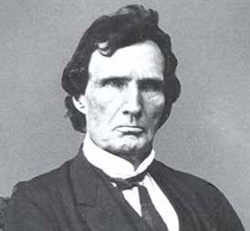Congressman Thaddeus Stevens
Born in Danville, Vermont, on April 4, 1792, Thaddeus Stevens had an uneasy childhood. He was born with a club foot. His father was an alcoholic who was unable to hold a steady job. His mother worked as a housekeeper.
Stevens graduated from Dartmouth College in 1814, then moved to York, Pennsylvania, where he taught school and studied law. After he was admitted to the bar, he established a successful law practice, first in Gettysburg, then in Lancaster, developing a reputation for his use of the insanity defense, a rarity at the time.
He entered politics as a Pennsylvania State Senator, serving from 1833 to 1841 as a member of the Whig Party. In 1948, he was elected to the U.S. House of Representatives, where he served until 1853. While in Congress, he played a role in the  campaign against the Fugitive Slave Act, passed in 1850. campaign against the Fugitive Slave Act, passed in 1850.
After the demise of the Whig Party, Stevens was reelected to the Congress in 1859 as a Republican, and soon wielded great power as the Chair of the House Ways and Means Committee.
Stevens supported the election of Abraham Lincoln, but soon became a critic of the Presidentís moderate policies toward the South, favoring a war of extermination and recolonization of the South, abolishing the old state lines.
After the assassination of President Lincoln, Stevens was a lead instigator of the impeachment charges brought against President Andrew Johnson.
By then he was so ill that he had to carried into the Senate chamber during the impeachment trial, and died a few months after Johnsonís acquittal.
|

